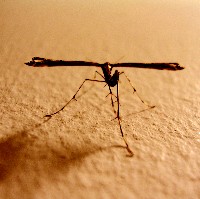 The Agency for Science, Technology and Research (A*STAR), Singapore’s main science funding agency, and Singapore clinical chip manufacturer Veredus Laboratories unveiled a new automated lab-on-a-chip device that can diagnose 13 tropical diseases from a single blood sample. Veredus is a subsidiary of STMicroelectronics specializing in medical diagnostics.
The Agency for Science, Technology and Research (A*STAR), Singapore’s main science funding agency, and Singapore clinical chip manufacturer Veredus Laboratories unveiled a new automated lab-on-a-chip device that can diagnose 13 tropical diseases from a single blood sample. Veredus is a subsidiary of STMicroelectronics specializing in medical diagnostics.
The partnership between A*Star and Veredus that developed the new diagnostics chip, called VereTrop, began in 2009. and aims to provide an easy-to-use portable device for uncovering cases of disorders and conditions that can be difficult to diagnose. “Tropical diseases often reflect common symptoms like fever, and may not be accurately diagnosed early by doctors,” says Lisa F.P. Ng, a professor in A*Star’s Singapore Immunology Network.
A*Star and Veredus say VereTrop can detect the following diseases:
– African trypanosomiasis (sleeping sickness)
– Human American trypanosomiasis (Chagas disease)
– Malaria
– Typhoid Fever
– Leptospirosis (Weil’s syndrome)
– Melioidosis
– Chikungunya fever
– Dengue fever
– West Nile virus
– Yellow fever
– Japanese encephalitis
– Rift Valley fever
– Hand, foot and mouth disease
– Hemorrhagic fever with renal syndrome
– Hantavirus cardiopulmonary syndrome
“This portable test kit is a rapid and reliable method to accurately test for multiple pathogenic targets from just one blood sample in a matter of hours,” notes Ng. Researchers from Singapore Immunology Network, including experts in malaria that afflicts 219 million people worldwide, validated the VereTrop test kit on patient samples in northern Thailand near the Myanmar border.
The biochip is built on Veredus’s Lab-on-Chip platform that combines micro-electro-mechanical systems with microfluidics. The chip platform is designed to integrate diagnostic functions such as polymerase chain reactions for DNA amplification and microarray detection that can be conducted without highly trained staff.
A*Star’s technology transfer unit funded the project, including design of the sequence probes, as well as development and validation of the chip, up to the point of collecting samples for the validation. The amount of funding was not disclosed.
Read more:
- Gates Foundation Funds, Invests in Tropical Disease Research
- Economic Growth Affected by Parasitic, Insect-Spread Disease
- Report: Pharmas Increasing Medicine Access in Poor Regions
- Buffalo, Zimbabwe Universities Partner on Nanotech Medicines
- Trial Shows Vaccine Effective Against Most Dengue Viruses
Photo: Germán Meyer/Flickr
* * *

 RSS - Posts
RSS - Posts
You must be logged in to post a comment.